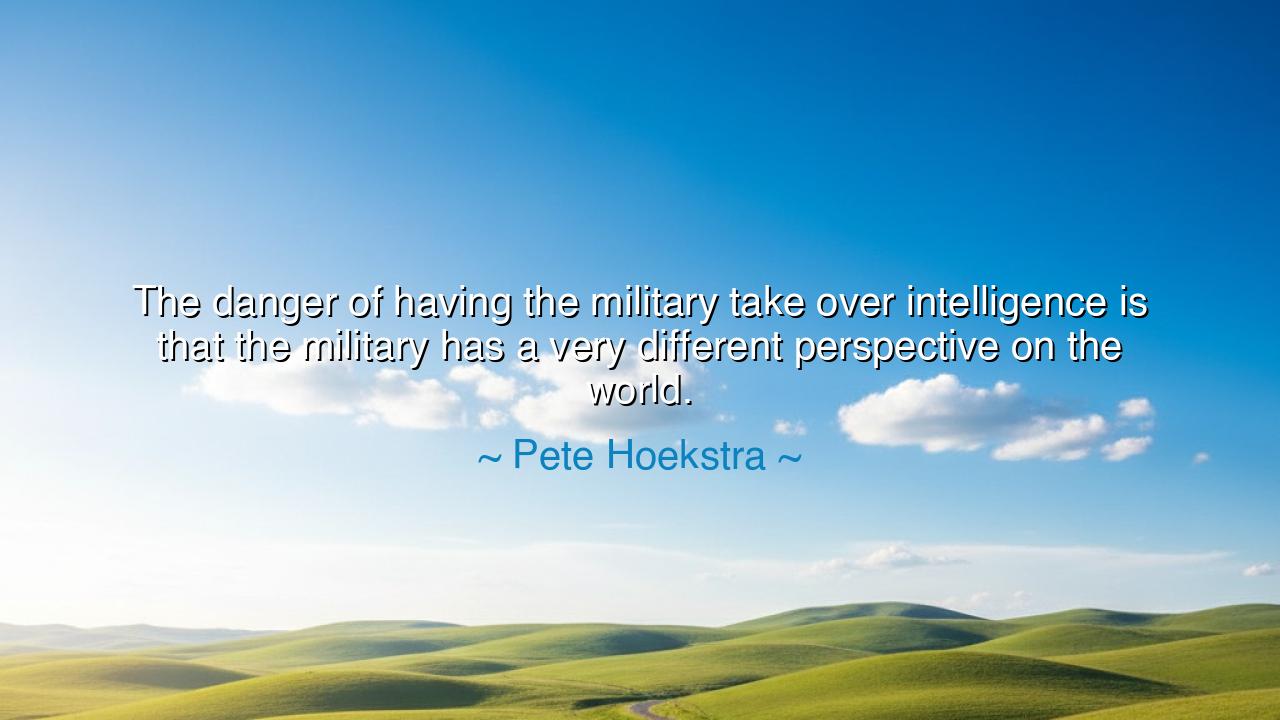
The danger of having the military take over intelligence is that
The danger of having the military take over intelligence is that the military has a very different perspective on the world.






Here is an ancient-style reflection on Pete Hoekstra’s quote:
The Eyes That Watch the World
When Pete Hoekstra said, “The danger of having the military take over intelligence is that the military has a very different perspective on the world,” he spoke with the clarity of one who understood that power without balance becomes perilous. His words echo through time as both warning and wisdom — a reminder that knowledge and force must never merge too tightly, lest truth itself become a weapon. For in the eternal dance of nations, the sword and the mind must serve each other, but never become one.
The meaning of his words lies in the distinction between understanding and control, between the seeker of knowledge and the wielder of might. The military sees the world through strategy, order, and survival — its duty is to protect, to destroy if necessary, to act swiftly when danger rises. Intelligence, however, seeks to observe, to question, to understand the hidden motives of men and the quiet tremors before the storm. When force assumes the place of thought, the delicate art of discernment gives way to the urgency of command, and truth itself risks becoming a casualty of purpose.
The origin of this insight is found in the years following the great upheavals of the modern world — the wars, the terror, the fear that shadowed the dawn of the twenty-first century. Hoekstra, a guardian within the chambers of policy and security, saw how easily power can overshadow wisdom when fear demands certainty. His warning was not against soldiers, but against imbalance — the danger that those trained to act might silence those trained to think. For a nation that allows force to shape truth will one day find that its might has blinded it.
History bears countless witnesses to this truth. In the final days of the Roman Republic, the legions became the arbiters of law, and generals the authors of truth. The sword that was meant to defend the state soon ruled it. Julius Caesar, once hailed as protector, became the destroyer of the republic’s delicate equilibrium between power and reason. The senators, who once debated with words, found their voices drowned by the discipline of the camp and the roar of the crowd. From that moment, Rome ceased to be a republic of laws and became an empire of command. Such is the fate of every nation where intelligence bends before power.
Yet Hoekstra’s words carry not only caution, but counsel. They remind us that every realm — whether of nations, of communities, or of the individual soul — must keep its balance between strength and wisdom. The warrior must respect the scholar; the hand that acts must listen to the mind that reflects. For intelligence without courage is powerless, and courage without insight is blind. The true guardians of peace are those who can wield both sword and understanding without letting one consume the other.
Even within the self, this lesson holds true. The mind and the will are like intelligence and the military — one observes, the other acts. When the will dominates without reflection, we become reckless; when thought delays without resolve, we become stagnant. Harmony between contemplation and action is the mark of both wise rulers and wise souls. To live rightly, as to govern rightly, one must learn when to observe and when to strike — and never let fear make one mistake the other.
Therefore, O listener of future generations, remember this: power must always kneel before wisdom. Let no army, no leader, no institution hold dominion over truth. Seek always to preserve the independence of thought, for it is the conscience of civilization. When intelligence becomes the servant of force, justice falters and freedom fades. But when the two walk hand in hand, guided by humility and purpose, nations endure, and the world remains watchful, not wrathful.
So heed Hoekstra’s warning: the might of a nation is not measured by the size of its armies, but by the freedom of its thinkers. Keep the sword sharp, but keep the mind sovereign. For as long as reason remains unshackled, the world shall not descend into the blindness of power — and truth, though fragile, shall remain unbroken.






AAdministratorAdministrator
Welcome, honored guests. Please leave a comment, we will respond soon